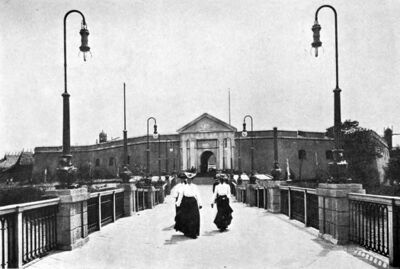Walled City: Difference between revisions
Public wiki for the 1904 Louisiana Purchase Exposition
No edit summary |
No edit summary |
||
| Line 9: | Line 9: | ||
| location = [[Philippine Exhibit]] | | location = [[Philippine Exhibit]] | ||
| no_buildings = 1 | | no_buildings = 1 | ||
| construction_cost= | | construction_cost= $36,896 (${{Format price|{{Inflation|US|36896.15|1904}}}} in {{Inflation/year|US}}) | ||
| furnishing_cost = | | furnishing_cost = | ||
| profit = | | profit = | ||
Latest revision as of 03:47, 6 March 2024
 | |
| Location | Philippine Exhibit |
|---|---|
| No. of Buildings | 1 |
| Construction | |
| Construction Cost | $36,896 ($1.11 million in 2021) |
Directly across the Bridge of Spain to the Philippine Exhibit was the Walled City, a reproduction of the fort at Manilla.
Etymology[edit | edit source]
Before the Fair[edit | edit source]
Description[edit | edit source]
Within the building was are exhibited relics of the various Philippine wars. An immense number of historic relics made this building an interesting museum. Both Constabulary and Scouts lived inside the Walled City, which showcased a large collection of weapons. The Constabulary Guard, the native police-military organization of the Philippines, were commanded by American and native and had an eighty piece band. John Philip Sousa said, after hearing a concert by this native band, "I marvel at their skill."
